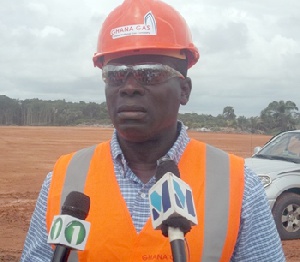...Even as project is 72% complete
Ghana’s dream of producing natural gas to cut the millions of dollars the VRA spend in purchasing daily crude for power generation is been threatened as the Ghana National Gas Company (GNGC), operators of the Western Corridor Gas Infrastructure Development project ongoing at Atuabo in the Western Region, is wreath in miasma of financial and structural challenges.
Information available to The Al-Hajj suggests that the over 850 million dollar world class gas infrastructure, which is only second to the Akosombo dam in terms of magnitude, investments and expected returns, aside the GHC 20 million seed money provided GNGC by the late Mills administration in 2011 and additional GHC 20 million last year, an outstanding GHC 38 million being part of the company’s startup capital is yet to hit the accounts of the state firm undertaking the project. Though another GHC 10 million is said to have been approved by the Finance Ministry few weeks ago, the Controller and Accountant General is yet to release the amount to the GNGC. A source close to managers of the project say, the intervals at which monies for the project is been released is greatly affecting the company.
Ominously, the agreement covering the project signed between GNGC and SINOPEC, the Chinese Company undertaking the project is still without parliamentary approval, therefore, going by a recent ruling by the Supreme Court in the Waterville and Martin Amidu case, there is no legal framework for the project. Meanwhile, other sources at the GNGC say, with the said GHC 10 million yet to hit the company’s accounts, all the finances supplied them by the government have dried up, a situation that is said to have ‘knocked’ the pioneering gas infrastructure company into a situation where payment of staff salaries and overhead expenditures have become problematic.
Aside the delay in the disbursement of the $3 billion China Development Bank (CDB) loan and the loss of a container with vital components for liquefied petroleum gas storage tank off the coast of South Africa, which has severely affected the December expected completion date of the project, our sources revealed that managerial and structural defects have also given rise to a situation where there is lack of harmony among the executives of GNGC. The lack of a proper organizational structure according to our source has given room for power play among the executives as they seemed to be crisscrossing each other’s functions, and this is creating serious disquiet in the managerial setup of the company, which is utterly threatening the final completion of the project which Chief Executive of the GNCC, Dr. Sipa Yankey says is about 72 percent complete.
But, a senior management member who wants to remain anonymous discounted the wrangling allegation, explaining that “When the company was started, it was proposed that we get two deputy Chief Executives but that was shot down on the account that the company was an infant one, but we were made to know we could do that as the company grows”
The source however admitted, the company was facing financial difficulties with the way the proposed seed capital for the company was being released.
Due to the inability to complete the project on the scheduled date which has now been shifted to the end of the first quarter of 2014, the nation is reported to have already lost an estimated $340 million in revenue. According to its Chief Executive in an interview with the GNA, the GNGC would incur revenue loss of $135 million for the sale of lean gas to the VRA and an additional revenue loss of $70 million from the production and sale of LPG. Though the company and by extension the project is reeling in difficulties, individual managers are said to have unfortunately but successfully conquered turfs and are milking the company through the award of contracts, employment opportunities and in some extreme cases, pure sabotage; a sourced told this paper.
The Gas Infrastructure Project, which is the largest project the NDC government has embarked on in the past five years, involves receiving gas from the oil and gas fields in the Tano (Western) Basin and processing it into lean gas, propane, butane and condensate.
The overall goal of the project is to “ensure that natural gas, associated gas and NGLs produced in Ghana are effectively and efficiently processed into clean fuels and feedstock for domestic, and export market; promote the development of petrochemical industries; substantially reduce and/or eliminate flaring of gas; and develop Western Region of Ghana as a new economic growth pole for the country in the long term. The initial gas to be processed will come from the Jubilee field which is located approximately 50km offshore Ghana, in the Western Region.”
In his recent interview with the Ghana News Agency, the CEO of the GNGC, Dr. George Sipa-Adja Yankey acknowledged the importance of the gas infrastructure project to the development aspirations of the country because it would half the $3million dollars a day the VRA spent in purchasing crude oil for power generation.
He said the gas processing plant was expected to receive 140 million Standard Cubic Feet of raw gas per day from the Jubilee Oilfield. The plant would then separate raw gas into various components as well as other mineral residues like propane, bitumen and others.
The lean gas according to the CEO would then be transmitted through pipelines to the Aboadze metering station for power generation.
Dr. Yankey said so far, both the onshore and offshore pipelines from the Jubilee Oilfield to Atuabo through to Aboadze Thermal Plant had been laid. Two LPG storage tanks that would store 4,000 meter cube of gas were also nearing completion.
However, according to our source at the facility, “government’s immediate intervention in the GNGC saga at this crucial moment of the NDC’s flagship project is very crucial if the dream project is to come alive”.
Business News of Tuesday, 1 October 2013
Source: Al-Hajj

















